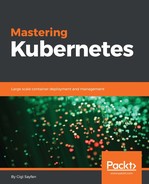- Mastering Kubernetes
- Table of Contents
- Mastering Kubernetes
- Credits
- About the Author
- About the Reviewer
- www.PacktPub.com
- Customer Feedback
- Preface
- 1. Understanding Kubernetes Architecture
- 2. Creating Kubernetes Clusters
- 3. Monitoring, Logging, and Troubleshooting
- 4. High Availability and Reliability
- High-availability concepts
- High-availability best practices
- Live cluster upgrades
- Large-cluster performance, cost, and design trade-offs
- Summary
- 5. Configuring Kubernetes Security, Limits, and Accounts
- 6. Using Critical Kubernetes Resources
- Designing the Hue platform
- Using Kubernetes to build the Hue platform
- Separating internal and external services
- Using namespace to limit access
- Launching jobs
- Kubectl get pods
- Mixing non-cluster components
- Employing init containers for orderly pod bring-up
- Evolving the Hue platform with Kubernetes
- Summary
- 7. Handling Kubernetes Storage
- Persistent volumes walkthrough
- Public storage volume types - GCE, AWS, and Azure
- GlusterFS and Ceph volumes in Kubernetes
- Flocker as a clustered container data volume manager
- Integrating enterprise storage into Kubernetes
- Summary
- 8. Running Stateful Applications with Kubernetes
- Stateful versus stateless applications in Kubernetes
- Shared environment variables versus DNS records for discovery
- Running a Cassandra cluster in Kubernetes
- Summary
- 9. Rolling Updates, Scalability, and Quotas
- Horizontal pod autoscaling
- Performing rolling updates with autoscaling
- Handling scarce resources with limits and quotas
- Choosing and managing the cluster capacity
- Pushing the envelope with Kubernetes
- Summary
- 10. Advanced Kubernetes Networking
- Understanding the Kubernetes networking model
- Kubernetes networking solutions
- Using network policies effectively
- Load balancing options
- Writing your own CNI plugin
- Summary
- 11. Running Kubernetes on Multiple Clouds and Cluster Federation
- Understanding cluster federation
- Managing a Kubernetes cluster federation
- Setting up cluster federation from the ground up
- Initial setup
- Using the official hyperkube image
- Running the federation control plane
- Registering Kubernetes clusters with federation
- Updating KubeDNS
- Shutting down the federation
- Setting up cluster federation with Kubefed
- Running federated workloads
- Summary
- 12. Customizing Kubernetes - API and Plugins
- Working with the Kubernetes API
- Extending the Kubernetes API
- Writing Kubernetes plugins
- Writing an authorization plugin
- Summary
- 13. Handling the Kubernetes Package Manager
- 14. The Future of Kubernetes
- Index
In the previous section, we looked at running Kubernetes on cloud providers. This is the dominant deployment story for Kubernetes. But there are strong uses cases for running Kubernetes on bare metal. I don't focus here on hosted versus on-premises. This is yet another dimension. If you already manage a lot of servers on-premises, you are in the best position to decide.
Bare-metal clusters are a bear, especially if you manage them yourself. There are companies that provide commercial support for bare-metal Kubernetes clusters, such as Platform 9, but the offerings are not mature yet. A solid open-source option is Kargo from Kubespray, which can deploy industrial-strength Kubernetes clusters on bare metal, AWS, GCE, and OpenStack.
Here are some use cases where it makes sense:
- Price: If you already manage large-scale bare clusters, it may be much cheaper to run Kubernetes clusters on your physical infrastructure
- Low network latency: If you must have low latency between your nodes, then the VM overhead might be too much
- Regulatory requirements: If you must comply with regulations, you may not be allowed to use cloud providers
- You want total control over hardware: Cloud providers give you many options, but you may have special needs
The complexities of creating a cluster from scratch are significant. A Kubernetes cluster is not a trivial beast. There is a lot of documentation on the Web on how to set up bare-metal clusters, but as the whole ecosystem moves forward, many of these guides get out of date quickly.
You should consider going down this route if you have the operational capability to trouble to debug problems at every level of the stack. Most of the problems will probably be networking-related, but filesystems and storage drivers can bite you too, as well as general incompatibilities and version mismatches between components such as Kubernetes itself, Docker (or Rkt, if you brave it), Docker images, your OS, your OS kernel, and the various add-ons and tools you use.
-
No Comment
